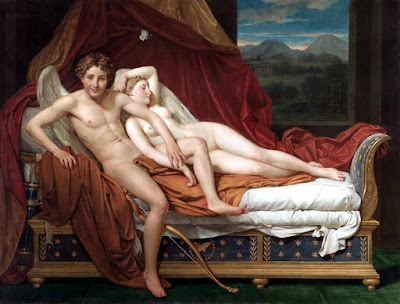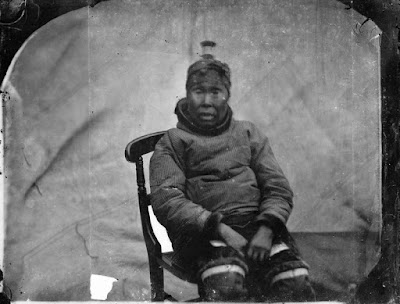Week 3 Story: Your Story or Mine
Throughout human history, war has plagued mankind and resulted in the loss of countless lives. One such war, fought not terribly long ago, ended only after great bloodshed and sorrow. One side emerged victorious after six years of fighting, ruling over its vanquished enemy and absorbing its lands and people. As tends to happen after wars, books upon books were published praising the efforts of the winning nation's soldiers while lambasting the defeated. As the saying goes, history is written by the victorious.
One day, several years after the war had ended, two scholars met to discuss a recent publication about the war. One of the scholars was from the conquering nation, a young man who had escaped fighting in the war and had continued his studies as it raged on. The other was an elderly scholar from the conquered nation who had seen his own country win and lose several wars in his long lifetime, this last being the final event that brought his nation to its knees. He and his countrymen had not published any works relating to this war as the ruling nation had forbidden any discussion of the conflict by scholars from the conquered nation, hoping to avoid the reigniting of anger and the revealing of the violence and pain that the conquered people had suffered.
Almost before the old scholar had sat down, the young man was exclaiming about the wonders of this new work, how it truly shed light on the events of the war in a way no other work had yet accomplished. As the young scholar praised the book which had been written by his fellow countryman, and reveled in its findings that the war had been justified, had been in retaliation for the conquered nation's aggressions, the old man listened with a patient expression. He had already been threatened numerous times with termination and possibly prison if he dared speak out about any literature or media published about the war. His opinions were unwanted and, in the new government's eyes, dangerous. So the elderly scholar sat and listened for half an hour as the young man continued.
Finally, the young scholar finished his monologue on the publication and sat down, quite satisfied that he had shown the value of the book and its importance in the field of history in a way even the old man could not deny. Turning to the other, he asked him what he thought of the work, knowing full well that the scholar could not legally criticize any work on the topic. The young scholar eagerly waited for the praise he was sure would come, praise he had gotten used to as no scholar from the conquered nation dared to oppose his or his fellow countrymen's account of the conflict.
Finally the old man spoke: "The book tells the story I thought it would, the story of your people and their experiences. However, if any of my countrymen had written such a piece, it would tell a vastly different tale, one filled with the horrors inflicted on them by your government. It is easy to tell your truth when the other side is threatened into silence." With that, the old man left the room and the shocked young scholar and went back to his apartment, where he was found dead by the authorities the next morning, having fought back in his own small way.
Photo by Ben Welsh. Source: Flickr
Author's Note:
This story is a retelling of the Lion and the Statue from Joseph Jacobs' The Fables of Aesop. In this fable, a man discusses with a lion which of them is stronger. The man then takes the lion to a statue that shows a man slaying a lion and claims that this proves his point. The lion then remarks that the statue was made by a man and would therefore tell a very different story if it had been made by a lion. I retold this story setting it in modern times (the last century or so) shortly after a war, with two scholars, one form the conquering country, the other from the conquered, representing the man and the lion, respectively.
Bibliography: The Lion's Share in The Fables of Aesop by Joseph Jacobs (1894).




The serious and ancient tone of this story is powerful and enjoyable. While telling us few details of the war, it's not hard to extrapolate out the rest and the results, as the state of their world is reflected in the conversation between the scholars. I think that the ending felt a bit quick, and could possibly have been eased into for greater impact. Overall, the haunting story told to us is powerful, and the moral is applicable and subtle.
ReplyDeleteWow. I like how you took Aesop's story and changed the setting to make it more applicable to a modern audience. This was a really interesting allegory for privilege and discrimination as well - I found myself imagining as I read that the two characters could be a white person and a person of color, a straight person and an LGBT+ person, a rich person and a poor person, etc. This could be the story of anyone who hasn't been allowed to fully speak the truth about their experience.
ReplyDeleteIs there any significance to the two men being from different generations? I wondered if you were making a point about age and wisdom as well as oppression, or if it was coincidental that they had a large age gap.
I wondered also if you had considered using a more specific example - WWI, WWII, etc. I realize that would be more challenging to write, since it would be much more political, but it would be interesting to read a version with a more concrete context!
Rebecca,
ReplyDeleteThat was a super interesting read! I love the detail and depth that you added to the story, and the perspective that you were able to give it by modernizing it like this. It was really well written and easy to follow.
I wonder why the young man was so eager to convince the older scholar of the merits of his work. Perhaps more information could be given about the circumstances under which they meet? It seems like the older man would never be "allowed" to speak out about anything at all, and I wonder why the new government even cared about his opinions.
Maybe you could consider providing more detail at the end as well. It was very concise, but I had to reread it for a second to figure out who died! Overall, I really enjoyed the story. It was an interesting take on the fable and really shed light on how history is written by the victors!
Hi Rebecca! I am a really big fan of taking classic stories, such as the one you selected, and altering them slightly to change the meaning and context, while still paying homage and respect to the original! You have definitely done that, and I really enjoyed how you modernized the setting to make it more applicable! Did you consider how the scholars are of different generations and how there is a universal idea of each successive generation getting "worse" in the eyes of the past generations? I think it's always applicable to point out in a story like this! One suggestion from me would be to include a little more setting detail to really enrich the reading experience! I think it would only add to a great story that you crafted!
ReplyDelete